

Inviting Global Perspectives into the Classroom - November Learning. Article Produced in Partnership with Cisco Education.
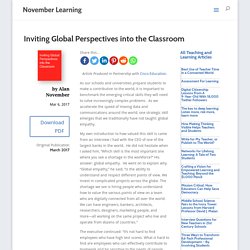
As our schools and universities prepare students to make a contribution to the world, it is important to benchmark the emerging critical skills they will need to solve increasingly complex problems. As we accelerate the speed of moving data and communications around the world, one strategic skill emerges that we traditionally have not taught: global empathy.
My own introduction to how valued this skill is came from an interview I had with the CEO of one of the largest banks in the world. He did not hesitate when I asked him, “Which skill is the most important one where you see a shortage in the workforce?” His answer: global empathy. The executive continued: “It’s not hard to find employees who have high test scores. The boundaries of relationships prescribed by our traditional classrooms typically limit students to conversations with peers sitting next to them. PowerPoint Presentation. Graduate School of Education. What is Action Research? According to the North Central Regional Educational Laboratory, Why do action research? : Innovation: Education. 5 benefits of doing action research in the classroom Teachers are constantly tinkering, creating, learning, and growing.
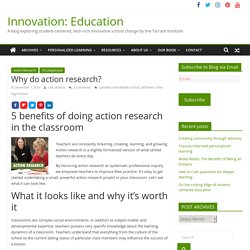
Action research is a slightly formalized version of what skilled teachers do every day. By honoring action research as systematic professional inquiry, we empower teachers to improve their practice. It’s easy to get started undertaking a small, powerful action research project in your classroom. Let’s see what it can look like. What it looks like and why it’s worth it Classrooms are complex social environments. This complexity means that large-scale education research has limited applicability on a day-to-day basis. What is action research? Sharing research in schools through a Research Report. ‘The research says’ is often an empty statement used as a basis for an argument for a particular education reform, approach or product.
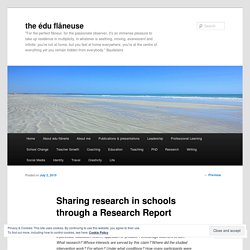
I encourage teachers to ask: What research? Whose interests are served by this claim? Where did the studied intervention work? For whom? Under what conditions? Dylan Wiliam has recently noted in a TES article that: “classrooms are just too complicated for research ever to tell teachers what to do. I agree that teachers and school leaders need to become critical consumers of research. There are a number of ways via which schools can engage in research. The Report is not a place for only long reads or complex academic papers, although these are included when relevant. The Purpose of a Critical Friend in Action Research.
With a Little Help from a Critical Friend, Educational Action Research, 2016. Oncology Nursing Society. Uow012042. A Great Example of Sharing Stories Through Google's My Maps. Kevin Hodgson's blog has been one of my daily reads for the better part of the last ten years.
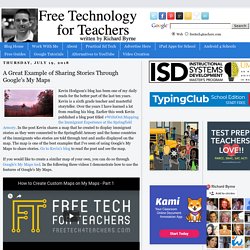
Kevin is a sixth grade teacher and masterful storyteller. Over the years I have learned a lot from reading his blog. Earlier this week Kevin published a blog post titled #WriteOut:Mapping the Immigrant Experience at the Springfield Armory. In the post Kevin shares a map that he created to display immigrant stories as they were connected to the Springfield Armory and the home countries of the immigrants who stories are told through text and audio displayed on the map.
The map is one of the best examples that I've seen of using Google's My Maps to share stories. What Is Action Research? Purpose of Action Research. Action Research, a scholarly approach to improve teaching and learning, can be a central piece of professional development.
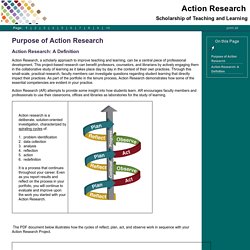
This project-based research can benefit professors, counselors, and librarians by actively engaging them in the collaborative study of learning as it takes place day by day in the context of their own practices. Through this small-scale, practical research, faculty members can investigate questions regarding student learning that directly impact their practices.
The Center for the Study of BoysThe Center for the Study of Boys. Year Two Theme: Collaboration and the Power of Successful Learning Groups Amy Burlein (Second Grade Teacher): Collaboration, Choice, and a Love of Reading: As the parent of a second grade boy who only read because he had to, I wanted to try a different take on DEAR (Drop Everything And Read) time in an attempt… Read more We have identified what works for boys in grades 6-12, but how are these findings similar or different for younger boys?
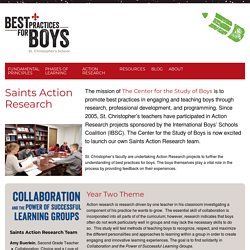
From 2014-2016, St. Christopher’s participated in a research cohort of four primary schools in the United States, Canada, and Australia to tackle this question. Through parent surveys and focus groups, teacher surveys and interviews,… Read more Laura Ambrogi (Lower School): Motivating Writers Your students are happy to discuss the books they read, but writing about it is often a very different story. Citizen Science – involving students in real world activities. Involving students in active projects during the closing weeks of the school year is not only a productive use of the closing weeks, it’s also an opportunity to introduce students to Citizen Science and kindle a fire of enthusiasm they can follow up further over the summer holidays.
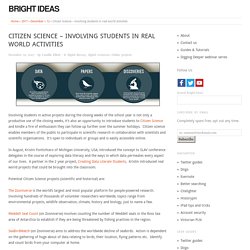
Citizen science enables members of the public to participate in scientific research in collaboration with scientists and scientific organisations. It’s open to individuals or groups and is easily accessible online. In August, Kristin Fontichiaro of Michigan University, USA, introduced the concept to SLAV conference delegates in the course of exploring data literacy and the ways in which data permeates every aspect of our lives. A partner in the 2 year project, Creating Data Literate Students, Kristin introduced real world projects that could be brought into the classroom. Potential Citizen Science projects (scientific and historical) are: Action Research in Education: Methods & Examples - Video & Lesson Transcript.